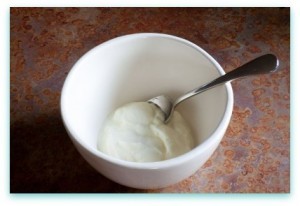Gut health plays a pivotal role in your overall health. You can optimize your digestion – and end bloating – by eating nutritious foods containing naturally occurring probiotics as well as more dietary fiber to feed the beneficial bacteria in your gut.
Lower within this article, the 6 key causes of gut imbalance are revealed. The included video should also prove helpful.
What Is Gut Health?
Gut health refers to the condition of your gastrointestinal tract and – in particular – your ability to digest food and absorb nutrients.
A healthy gut has a microbiome inhabiting your intestines, comprised of trillions of microorganisms.
If the garden of your microbiome is growing well, then these microorganisms are flourishing in the correct amounts and ratios – and performing in symbiotic harmony.
However, sometimes, these organisms get out of balance.

Should You Take Probiotics for Healthier Digestion?
Probiotics are being added to certain processed foods and promoted on television to help with digestion:
- is this just a current buzzword to attract attention?
- are probiotics right for you?
They’re talking about the balance of good and bad organisms in the gut in the TV commercials.
Two things are commonly found when cultures are grown from gut organisms:
- there is an abundance of bad bacteria (or “bad bugs”);
- good bacteria are absent.
This is called gut dysbiosis, when bad bacteria are abundant, and there are few good bacteria in the gut. It’s not a sign of good health.
Modern lifestyles sometimes make it difficult to keep the human body healthy.
6 Lifestyle Factors That Are Bad for Your Intestines
Some experts believe that when digestion is unhealthy, and the stomach and intestines are overloaded with toxicity from the standard modern diet and environmental exposures, the human body pads the vital organs with extra visceral and subcutaneous fat as a protective defense.
In other words, the waistline grows.
It may be that a healthier digestive system negates the need for the body to start padding organs with extra fat.
To get your gut healthier, you need to know the danger zones.
…probiotics are required for healthy gut microbial balance and therefore also for good general health”
Here are some key causes of unhealthy imbalance in the gut:
1. Stress Is Bad for Your Digestion
Stress causes a change in gut pH, which negatively impacts the growth of good gut bacteria.
2. Not Enough Fiber Is Bad for Your Colon
Good bacteria feed on fiber. If you don’t have enough fiber, you starve the good guys.
The Physicians’ Committee on Responsible Medicine has cited numerous research studies that have validated that an increase in fiber decreases the risk of colorectal cancer.
3. Sugar Can Create Intestinal Permeability
Sugar feeds bad bacteria, which might contribute to a leaky gut, which, in turn, can cause autoimmune issues.
4. Trans-Fats Are Bad for Your Digestion
A diet high in trans-fats, seed oils, and hydrogenated oils will reduce bile flow – bile helps regulate gut pH and food transit time needed to support the growth of good gut bacteria.

5. Antibiotics Can Sometimes Impair Gut Health
Antibiotics – which can come from a prescribed pill or commercially prepared meat like chicken, beef, or pork – may kill off the good gut bacteria.
Of course, if your doctor tells you to take antibiotics, follow that advice. But after the round of medication, you may need to re-seed your gut with new, good bacteria.
6. An Absence of Fermented Foods Can Deplete Important Probiotics from the Gut
Is your body’s digestive process optimized?
Many people have some sort of digestive issue, whether they know it or not.

Healthy probiotics have been shown to improve digestive function, and this can be accomplished, in part, by ingesting more fermented foods such as yogurt (including the non-dairy, unsweetened type from coconut), sauerkraut, kefir, tempeh, kombucha, and kimchi.
Probiotics and the Benefits of a Balanced Gut
A healthy balance of gut bacteria has these additional benefits:
- improves or modulates the gut immune system;
- reduces the number of bad or unhealthy bacteria;
- helps to maintain a healthy gut by supporting the mucosal lining, which assists in blocking unhealthy organisms and foreign bodies from crossing into the circulatory system;
- and helps to improve liver function.
I believe that all of us need to go on a periodic re-seeding of the beneficial bacteria with fermented foods and a high-quality probiotic.
Consideration must also be given to supplying the required food for these good bacteria in the form of a prebiotic.

For those with a large imbalance of bad to good bacteria, I institute a type of weed-and-feed program:
- the “weed” is to kill off the bad bacteria;
- the “feed” is to re-populate the gut with good bacteria.
Improve Gut Health with High-Quality Prebiotics and Probiotics
A few years ago, I was meeting with a friend who had a strong nutritional background. We both knew the importance of probiotics, but he said that corporate America would make probiotics the new buzzword at the beginning of the 21st century.
These companies looked at test results of comprehensive stool analysis, which indicated that many citizens have a proliferation of bad bacteria or bugs in their digestive tract and too few healthy bacteria.
Almost everyone can be affected by an imbalance of proper gut bacteria.
Unfortunately, the more research that accumulates, the more we find that gut problems can be a contributing factor to just about every health condition.
The gut is closely related to our immune response – a big part of a healthy gut is a balance of gut micro-flora or bacteria.
Probiotics are a big factor in maintaining a healthy gut barrier to help keep unhealthy organisms and antibodies from entering the bloodstream. Healthy probiotics have been shown to improve liver function.

There are a couple of issues that need to be addressed when talking about probiotics:
1. Are all probiotics the same?
2. Do we need to feed the probiotic organisms?
Probiotics is not just a buzzword used to promote commercial food products. Probiotics are required for healthy gut microbial balance and, therefore, also for good general health.
“Bifidobacterium strain has been shown to have certain antimicrobial properties that may inhibit the growth of pathogens in the intestines [and] has also demonstrated protective properties against rotavirus infection. It may also have a favorable effect in treating human inflammatory bowel diseases.” – Kamal Patel / Examine.com

Our gut biome – the good bacteria in our bodies – evolved with us over the millennia in a mutually beneficial relationship. These conveyor-belt foods we eat now are a very recent development in human history. Can our biome make sense of processed grains, trans-fats, and high-fructose corn syrup, especially when consumed in relentless amounts?
Conclusion on the Importance of Optimized Digestion
In conclusion, healthy digestion requires balancing the good and bad bacteria in your gastrointestinal system. Modern lifestyles and diets can disrupt this delicate balance, leading to gut dysbiosis.
Remember, it’s not just the nutrients you eat that matter. It’s the nutrients your body can absorb that matter most. For that to happen, good gut health is required.
Avoiding things like stress, inadequate fiber, excess sugar, trans fats, antibiotics (if unnecessary), and lack of fermented foods promotes more bad bacteria over good.
Probiotics — whether naturally occurring in foods like unsweetened coconut yogurt or added to supplements — can help repopulate your gut with beneficial microorganisms.
A healthy microbiome strengthens your digestion, immune system, and liver function. Considering the gut-brain connection, probiotics may also improve mental health.
Overall, consciously limiting gut-disrupting factors and increasing gut-healing foods creates optimal digestion.
A proactive reseeding approach helps establish microbial balance, which is especially crucial after age 50.
Pay attention to prebiotic fibers, too – for “feeding” probiotics.
With research continuing to show the second brain’s influence on total wellness, a healthy gut biome serves as a vital key to aging vibrantly.
Additional Sources for Good Digestion:
Definition of Dysbiosis – http://www.wisegeek.com/what-is-gut-dysbiosis.htm
Insights into the Gut Biome – http://terrywahls.com/response-to-michael-polan/
Your Probiotic May Be Lying to You – https://examine.com/nutrition/your-probiotic-may-be-lying-to-you/
Gastrointestinal Inflammation and Repair: Role of Microbiome, Infection, and Nutrition – https://www.hindawi.com/journals/grp/si/426290/cfp/
New Research: Labdoor Tests Probiotic Formulas and Ranks the Top-10 – https://labdoor.com/rankings/probiotics
All About the Microbiome – https://chriskresser.com/the-gut-microbiome/

Enthusiasm! How to Lunge Joyfully Out of Bed Each Morning [Video]
Monday 8th of April 2019
[…] 5 Things that Can Mess Up Your Digestion […]
Man Up with a Green Smoothie • Over Fifty and Fit
Wednesday 13th of March 2019
[…] food enthusiasts believe so passionately in uncooked food is that there are often more antioxidant enzymes and vitamins present in their most natural state (as opposed to synthetic supplements) accompanied […]
Supple VS Sour: Avoiding the Mental and Physical Rigidity of Getting Older
Sunday 10th of June 2018
[…] there are solutions for lessening that feeling of agitation and its negative impact on our everyday […]
What is the Longevity Lifestyle? - Over Fifty and Fit
Saturday 5th of May 2018
[…] “Food is medicine.” So say the Japanese, whose culture has a much lower incidence of age-related diseases than their Western counterparts. […]
Over Fifty and Fit
Wednesday 28th of March 2018
[…] as your become more skilled in your smoothie-making, your taste buds will evolve, and then you’ll want to try adding more vegetables than fruits (in other words, you’ll […]